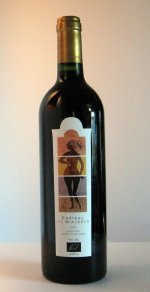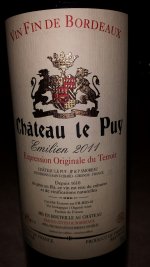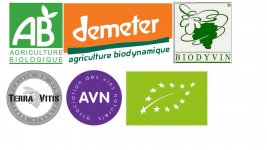How can you test for wine? I basically just grab whatever on sales at my local market. But lately I've been doing a lot of drinking so I thought I should be a little bit more discriminating. Merlot and Cabernet Sauvignon have been my go-to get high, I'd like to know what are you favorite. And how can you tell what's good?
You'll need a high impedance input to your test device, as wine is not a very good conductor. Shielding the wine is also a good idea as it tends to pick up a lot of noise. But other than that, you can treat it like any other resistor.
Or did you mean drinking it?
I mean how can you tell if one wine brand is better than the other? So far I can only tell if one brand is more sour or bitter compared to another. Most of the wine I bought are in the 7 - 8 dollar range so I guess being so cheap there is not much separating them. If I am going to die, I want to die on some decent wine.
The problem with wine is that it changed from year to year due to different growing conditions, sugar content in the grapes, etc. Once you find something you really like, stock up!
But what to look for? It depends on what you plan to do with your wine. You can drink it casually, with food, or both drink it and cook with it. Also I prefer room temperature reds in the winter and chilled whites in the summer, so time of year might come into play. Also, are you buying to drink it in the near future, or do you also want to build up "stock" in a wine cellar, or temperature and humidity controlled storage? For "drink now" don't spend any more than $20 a bottle for sure, or at least here in northern California there is no need to do that.
If you drink casually (that is you just pour yourself a glass of wine anytime and drink it) then I would avoid Cabs or Zins. They are too strong typically. Even Pinot Noir can be a bit much (to me) to drink without eating anything. Merlot is OK for this, however, and there are other Roses or blends like "Big Red Truck" that are table red wines that can be drunk casually as are reds from France like Beaujolais. For drink now whites, there are many to choose from depending on how sweet you like it. Reislings, and Pinot Grigio can be nice and light. Chardonnay is not my fav for just drinking, but some people like it. IMHO best when paired with some food, since it has some grassy/peppery notes that I don't like alone. Also, I like to keep some Sauvignon Blanc or Fume Blanc around because that is what I use when cooking. A little for the cook is also nice.
If you want to drink wine with food, then you have to consider what it is you are serving. This is a deep subject, but in general reds with red meat or greasy foul (duck for instance) or sometimes even greasy (e.g. sauteed) chicken can work. Whites are good with some cheeses, or with fish that is not strong in and of itself. But like I said, you can really go off the deep end with this.
Then there is the sparkling wine option. Something like Prosecco is really nice one and awhile in the summer for a more formal and fancy twist. There are good options that are not all that expensive and it's less over the top than champagne. It's all too easy to drink a lot of it, however!
It used to be that there were a few wineries that you could rely on. Now there are many, many to choose from and not just from the USA. Chile, New Zealand, and Argentina offer some good low cost wines. So you need to explore and rely on some guidance from wine magazines like Wine Spectator or someone in your local wine shop to guide you. Then you buy and try.
Have fun!
But what to look for? It depends on what you plan to do with your wine. You can drink it casually, with food, or both drink it and cook with it. Also I prefer room temperature reds in the winter and chilled whites in the summer, so time of year might come into play. Also, are you buying to drink it in the near future, or do you also want to build up "stock" in a wine cellar, or temperature and humidity controlled storage? For "drink now" don't spend any more than $20 a bottle for sure, or at least here in northern California there is no need to do that.
If you drink casually (that is you just pour yourself a glass of wine anytime and drink it) then I would avoid Cabs or Zins. They are too strong typically. Even Pinot Noir can be a bit much (to me) to drink without eating anything. Merlot is OK for this, however, and there are other Roses or blends like "Big Red Truck" that are table red wines that can be drunk casually as are reds from France like Beaujolais. For drink now whites, there are many to choose from depending on how sweet you like it. Reislings, and Pinot Grigio can be nice and light. Chardonnay is not my fav for just drinking, but some people like it. IMHO best when paired with some food, since it has some grassy/peppery notes that I don't like alone. Also, I like to keep some Sauvignon Blanc or Fume Blanc around because that is what I use when cooking. A little for the cook is also nice.
If you want to drink wine with food, then you have to consider what it is you are serving. This is a deep subject, but in general reds with red meat or greasy foul (duck for instance) or sometimes even greasy (e.g. sauteed) chicken can work. Whites are good with some cheeses, or with fish that is not strong in and of itself. But like I said, you can really go off the deep end with this.
Then there is the sparkling wine option. Something like Prosecco is really nice one and awhile in the summer for a more formal and fancy twist. There are good options that are not all that expensive and it's less over the top than champagne. It's all too easy to drink a lot of it, however!
It used to be that there were a few wineries that you could rely on. Now there are many, many to choose from and not just from the USA. Chile, New Zealand, and Argentina offer some good low cost wines. So you need to explore and rely on some guidance from wine magazines like Wine Spectator or someone in your local wine shop to guide you. Then you buy and try.
Have fun!
Last edited:
I mean how can you tell if one wine brand is better than the other? So far I can only tell if one brand is more sour or bitter compared to another.
I'm confused, are asking for a knowledgeable person to validate your choices? You seem to have made some perceptual observations and I would in general say trust your own perception of enjoyment. Many stores have try before buy days now since many of the stupid blue laws, etc. are getting repealed so you get to taste things even sometimes outside of your budget.
Wine at the high end has become even more a fashion item than audio there is almost no sense in it. Several of the greatest reds in the world have market prices that have virtually no variance with vintage, the technology is just not that good.
There are good options that are not all that expensive and it's less over the top than champagne. It's all too easy to drink a lot of it, however!
At the low end it is hard to beat CAVA from Spain, especially if you want something a little more on the dry side. Even SY serves it.
Last edited:
Good wines do not necessarily travel well .... too many variables in storage, transport method etc..
Try locally (?) produced wines first.
My favourite French white is Poully Fume or Poully Fuse .. both very easy to drink !!
My best of all time drink is Swiss red or white from the banks of Lac Leman - Fechy ( I doubt if you can get any without actually going there. ( I go every year to the annual wine festival and buy there.)
Andy
Try locally (?) produced wines first.
My favourite French white is Poully Fume or Poully Fuse .. both very easy to drink !!
My best of all time drink is Swiss red or white from the banks of Lac Leman - Fechy ( I doubt if you can get any without actually going there. ( I go every year to the annual wine festival and buy there.)
Andy
...many of the stupid blue laws, etc. are getting repealed...
As someone who was born and raised in Western Mass I can appreciate your distaste for those anachronistic laws that seem to be 21st century hangover from the good old Puritan times! I remember when you had to get all your liquor at the "packey store", or go out of state for deals. Are those huge liquor stores still operating just over the border in NH?
The supply chain has changed a lot here Martignetti's, Classic, etc. as retail are gone. You probably used The Big Y (one of the best retailers in the country at one time), I knew Paul at the Sturbridge store well. They carried everything top to bottom until 2000 or so, but the price differential has become simply unsustainable. NH still runs the state liquor thing with the occasional bottle of first growth Bordeaux at $1000's now.
That national chain has moved in here with high power lawyers and are stirring things up.
That national chain has moved in here with high power lawyers and are stirring things up.
I personally don't see the point of "try before buy". If I knew I wouldn't be able to afford certain type of wine, I probably won't bother. Some of the brands at my local stores are not bad that are around $7 per bottle. If I happen to have bought an inexpensive bottle that not to my liking, I don't mind. Sure once in awhile it's nice to try something that costs 20 - 30 per bottle but it's not something that I would remember.
Maybe you will see things differently if we make a little DIY loudspeaker analogy...
There are the boutique brands like Scan Speak, Morel, Accuton, etc. These are more or less known for good quality but are expensive and the actual quality can vary depending on the exact model you buy and the intended use (what kind of speaker you will build using the driver). On the other end of the scale there are innumerable buyouts and clearance drivers available through Parts-Express. Some of these are ridiculously inexpensive, but if you buy and test one or two and find that it is a gem and is just as good as a high-end driver. You might want to buy a number of them and use them whenever possible because when you do the result will be enjoyable.
If we replace drivers with wine, and how you will be drinking with how you will use the driver in a loudspeaker, and so on, you get much of the same types of choices that you experience when purchasing and drinking wine. Just like with loudspeaker building, there are many trade-offs and just as there is no "best" driver there is no "best" wine. Some experimentation is necessary.
There are the boutique brands like Scan Speak, Morel, Accuton, etc. These are more or less known for good quality but are expensive and the actual quality can vary depending on the exact model you buy and the intended use (what kind of speaker you will build using the driver). On the other end of the scale there are innumerable buyouts and clearance drivers available through Parts-Express. Some of these are ridiculously inexpensive, but if you buy and test one or two and find that it is a gem and is just as good as a high-end driver. You might want to buy a number of them and use them whenever possible because when you do the result will be enjoyable.
If we replace drivers with wine, and how you will be drinking with how you will use the driver in a loudspeaker, and so on, you get much of the same types of choices that you experience when purchasing and drinking wine. Just like with loudspeaker building, there are many trade-offs and just as there is no "best" driver there is no "best" wine. Some experimentation is necessary.
Interesting trend's in France is back to purity of the nature.
Many nasty chemicals is used inside who go to yours body's
Vine producers now try change that by not use any more of pesticides and lot of SO2 artificial sulphites.
That is not for huge international mass market.
Label is : AB, Demeter, Biodyvin.
Good vine because healthy ingrediens
Many nasty chemicals is used inside who go to yours body's
Vine producers now try change that by not use any more of pesticides and lot of SO2 artificial sulphites.
That is not for huge international mass market.
Label is : AB, Demeter, Biodyvin.
Good vine because healthy ingrediens
Attachments
Wine at the high end has become even more a fashion item than audio there is almost no sense in it. Several of the greatest reds in the world have market prices that have virtually no variance with vintage, the technology is just not that good.
There's a good doc on netflix about these wines and a guy who was faking them and selling some bottles for $100k. It's called Sour Grapes.
You could do a blind listening test. Send the signal thru one type of wine, then another. All you need is a normal interconnect cut in two, then the ends bared. Keep the ground connected, just dip the ends of the cables into the wine. Listen for differences. You can also do more objective tests, but listen first. You don't need much wine, just a glass for each channel will do.I mean how can you tell if one wine brand is better than the other?
When I was OP's age and had no experience, I was very lucky. I happened to live near a large wine store which took the time to make signs for every wine they sold. On each sign was written all the awards that wine had won (gold medal @ XYZ fair, etc). So I just bought all 8 of the gold medal winning zinfandels under $10 {this was long before Y2000} and tried them myself. I saved the empty bottles of the ones I really liked. Then I bought all the gold medal winning merlots under $10 and tried them myself. Then all the gold medal winning chardonnays under $10 and tried them myself. Then ... Imagine a nest of FOR-loops stepping through grape variety, medal color, and price.
After a couple or three months I had learned which grape varieties I liked most, and which particular vineyards I liked most. And it didn't cost an arm and a leg, and I didn't have to rely on anybody else's opinion. Now when taking a date to a restaurant, I knew several tasty wines already, at sensible price levels. Now when talking to wine store employees, I could ask for recommendations by saying "I really like the Merlot by Clos duBois vineyard; what else do you have similar to that?" etc. It's not black magic, it's not a foreign language, it's not pretentious posturing. It's just what you happen to prefer, your own personal self.
After a couple or three months I had learned which grape varieties I liked most, and which particular vineyards I liked most. And it didn't cost an arm and a leg, and I didn't have to rely on anybody else's opinion. Now when taking a date to a restaurant, I knew several tasty wines already, at sensible price levels. Now when talking to wine store employees, I could ask for recommendations by saying "I really like the Merlot by Clos duBois vineyard; what else do you have similar to that?" etc. It's not black magic, it's not a foreign language, it's not pretentious posturing. It's just what you happen to prefer, your own personal self.
You could always buy some 2 buck chuck and try it out - Charles Shaw wines at Trader Joes. Article | Trader Joe's
There's a good doc on netflix about these wines and a guy who was faking them and selling some bottles for $100k. It's called Sour Grapes.
I saw a bottle of fake 1945 Petrus, pretty good fake using genuine bottles from much cheaper wine or from an off vintage. That guy personally heavily damaged the rare wine auction circus, folks spent millions on good fakes and now are stuck. I wonder how much my empty 1945 Lafite is worth, the bottle is embossed "45" due to it being the victory year, hard to fake.
- Status
- This old topic is closed. If you want to reopen this topic, contact a moderator using the "Report Post" button.
- Home
- Member Areas
- The Lounge
- How to test wine?



